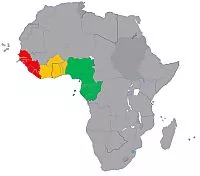The Independent National Electoral Commission (INEC) has declared Bola Tinubu as the winner of Nigeria's presidential election, held on 25 February. A divided opposition and a low turnout allowed the ruling All Progressives Congress (APC) to overcome a loss of popularity in its strongholds. The opposition may dispute poll results at the Supreme Court, but the political process remains stable, and the change of government is due in May.
Significance – Open race
Last week's presidential election was the most competitive since civilian rule was restored in 1999. Tinubu took 38% of votes in this election, but he and his two closest opponents won an equal number of states (see chart).
No. states by candidate = 36 states and the FCT
A key point from the election is that the ruling APC struggled in its northern base without its leader, President Muhammadu Buhari, who did not contest this time because he is completing his final term. The president is a spiritual leader for northern Muslims, but his party became increasingly unpopular during his eight-year rule due to the state of the economy and security. Consequently, the party lost the presidential election in Buhari's Katsina and other key states in its northern base.
Peter Obi further blew the race open despite running under the smaller Labour Party. A strong social media campaign endeared him to urban youth and to Christians in the largely Muslim north. He then beat the ruling APC's Tinubu in Lagos – the country's economic capital where Tinubu was state governor for eight years and was the undisputed strongman. He also beat Atiku Abubakar of the main opposition Peoples Democratic Party (PDP) in the rest of the mostly Christian south where Abubakar won by a landslide in 2019.1 With the PDP's historic strongholds lost, Abubakar slumped and the opposition vote was split.
Outlook – Stability
A team of US observers from the National Democratic Institute and International Republican Institute has said the presidential and parliamentary elections “fell well short of Nigerian citizens' legitimate and reasonable expectations”2 – pointing to INEC's use of a manual collation process that was previously prone to rigging.
Nigeria's former president Olusegun Obasanjo has also called for fresh elections, and the PDP and LP have echoed his claims that the manual transmission of results allowed manipulation and produced an outcome that did not reflect the will of the people.
On that note, this election season has not escaped politicised violence and now opposition parties may challenge Tinubu and the electoral commission at the Supreme Court, extending the current risk parameters. Such a case can continue even after a new president has been sworn in on 29 May.
Footnotes
1 Obi was Abubakar's running mate in the 2019 election.
The content of this article is intended to provide a general guide to the subject matter. Specialist advice should be sought about your specific circumstances.

